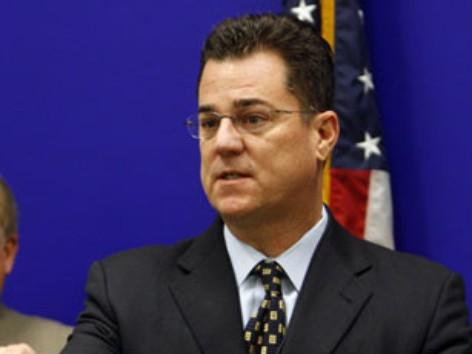By Wesley P. Hester
Richmond Times-Dispatch
March 3, 2011
http://www2.timesdispatch.com/news/pro-sports/2011/mar/03/tdmain01-mcdonnell-weighs-changing-time-limit-on-f-ar-879557/
 |
| Del. David B. Albo sponsored the legislation on behalf of Protect, a national organization to help children. |
Flipping through photographs five years ago, Becky Ianni came across an image that changed her life.
The photo was of a 9-year-old Ianni with Monsignor William T. Reinecke, a pastor at her family's Alexandria church who she says molested her for two years after befriending her family.
"He told me that God would be mad at me and I'd go to hell," said Ianni, now 53. "I figured what was happening was my fault and that God was punishing me because I was a bad person — I just buried it."
Finding the photo awakened those buried emotions. "I just couldn't put it aside any longer," she said.
Ianni's was one of several stories that helped legislation to dramatically increase the time limit under which victims of sexual abuse can file lawsuits clear this year's General Assembly. Two identical bills that would increase the limit from the current two years to 20 are on Gov. Bob McDonnell's desk.
If signed, the legislation would allow victims 20 years from the time of the incident, their 18th birthday or — in the event of repressed memories — from the time the abuse is remembered, to file suit. There is no limitation on criminal charges.
Ianni was not the first to come forward with allegations against Reinecke, who took his own life in 1992, days after being confronted by a former altar boy with a similar story. Shortly after his suicide, another male parishioner accused him of sexual abuse.
Ianni eventually negotiated a settlement to pay for her therapy, but it was too late for a lawsuit.
The Catholic Church opposed the 20-year limit during this year's legislative session in the wake of a wave of scandals and lawsuits that last year rocked the church, the second such controversy in less than a decade.
"When we talk about civil lawsuits, we're talking about not only actual perpetrators, but third parties being sued," said Jeff Caruso, executive director of the Virginia Catholic Conference. He noted that those parties could include churches, schools and nonprofit groups.
"If one were to discover abuse when they were age 50, they would have until age 70 to file a lawsuit (about abuse) that could have occurred during their childhood," he added. "After a certain amount of time, memories fade, witnesses either die or can't be found ... records may not even exist any longer."
Caruso pointed out that 39 other states have a limitation of eight years or less and that only six have periods of 15 years or more.
Del. David B. Albo, R-Fairfax, who sponsored the legislation in the House of Delegates, said he did so on behalf of Protect, a national organization to help children.
Albo said current limitations "don't really make sense given the fact that these people who have been molested as kids don't think normally."
Even if victims don't block out the memories, they may not realize that what was done to them was illegal until they undergo therapy, Albo said.
"None of these people can get their stuff together to be able to file a lawsuit in time (under current law)," he said.
The legislation originally proposed extending the limit to 25 years. Some proposed eight years instead, before 20 was agreed upon in both versions of the bill.
"It's very, very scary that we've now gone from two years to 20," said Mary Devoy, founder of Reform Sex Offender Laws of Virginia.
Devoy said many are wrongfully accused of abuse and that proving innocence becomes much more difficult over time.
"Sexual claims are 'he said, she said,' and in Virginia, an accusation alone is sufficient to convict," Devoy said. "All you need is an angry ex who wants custody of the kids or who doesn't want to pay alimony, and it's a done deal."
Ianni saw things differently, calling 20 years "a good start."
"I wish there was no statute of limitations," she said, "but this is a big improvement. I know how long it took for me to come forward, and I'm not unusual. The average victim doesn't come forward until they're like 40."
McDonnell said Sunday that he would seek the advice of Attorney General Ken Cuccinelli before reviewing the bill.
"We're going to look at it," he said, adding that "there are some unique issues regarding sex offenses that would warrant extensions of the statute of limitations."
McDonnell said he is empathetic, having worked with abuse victims as a prosecutor.
"I understand that sometimes, for a variety of circumstances, it takes awhile for civil or criminal charges to be brought," he said.
Devoy said she hopes the governor will agree that 20 years was too long.
"A civil case is all about money," she said. "It's not about justice, it's not about locking up an offender, it's not about protecting the public or feeling safe. It's all about money."
Ianni disagreed, saying the change could protect children by encouraging victims to expose predators who might commit future abuse.
"None of us want another child to go through this," she said. "And rarely does a predator have one victim."
(804) 649-6976
Contact: whester@timesdispatch.com
Any original material on these pages is copyright © BishopAccountability.org 2004. Reproduce freely with attribution.